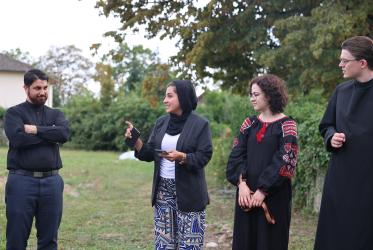Anxiety, stress and unexpected changes in lifestyles are making it increasingly difficult for many youngsters to cope with the COVID-19 pandemic. Alcohol and substance abuse are on the rise as young people desperately search for answers to what is happening around them. Mental health issues are rapidly following In the wake of the physical health and socio-economic issues caused by COVID-19.
Yet mental disorders sometimes do not evoke the same empathy as other diseases, said Dr Mwai Makoka, World Council of Churches (WCC) programme executive for Health and Healing. “They are often misunderstood and overshadowed by stigma, misconceptions, prejudice, and superstition.”
Some people wrongly believe that mental disorders are demonic, the result of a curse, or due to lack of willpower, Makoka added. “But just as our stomachs, lungs, skin, eyes and other body parts fall sick, our brains and mental faculties can also be afflicted by different illnesses.”
In a podcast aired on 27 August, Dr Brian MacLachlan, senior consultant psychiatrist at the Psychiatric Hospital in Bridgetown, Barbados; and Jeremiah Edward Bohol, a clinical psychologist from the United Methodist Youth Fellowship in the Philippines and psychology professor at the University of the Philippines, share their concerns about growing mental health problems among young people and elaborate on how faith communities can play a role in easing pain and sustaining hope among those affected.
“The question is how we equip our churches with tools that promote awareness and mental health wellness,” explains podcast moderator Joy Eva Bohol, WCC programme executive for Youth Engagement. “Mental health is a vital aspect of wellbeing throughout our lives—it is the ability to be self-aware, manage our emotions, and cope with problems.”
MacLachlan underlines education as a potent tool to raise awareness and mitigate judgmental behaviour against mental health patients. “There is still a lot of stigma associated with psychiatric facilities and mental health in general, but mental health and wellbeing, and mental health care and treatment, are important for our society in helping people live happy and productive lives,” he said. “Seeing a doctor for a mental health condition raises all kinds of questions and is very different from being treated for a concrete disease such as diabetes.”
Jeremiah Bohol elaborates on how faith communities can help in addressing the public stigma related to mental health problems and how they can provide comfort and relief.
“We look at practical ways to discern mental illness and be more accommodating and inclusive as a church community. We can ease burdens by listening to understand rather than listening to reply,” he says.
The podcast is first in a series moderated by members of the WCC COVID-19 Support Team, who have been answering questions from WCC member churches as the coronavirus pandemic continues.
"Coping with the Coronavirus" - WCC COVID-19 landing page






